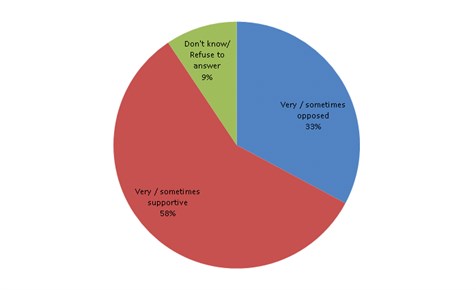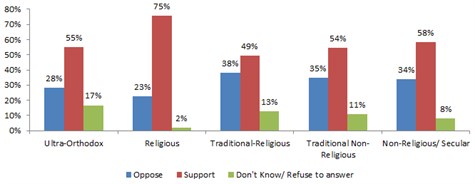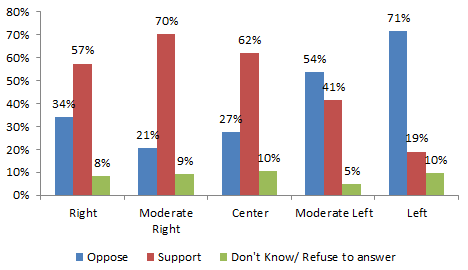Israeli Public Opinion on Reducing Funding to Organizations that Mark Independence Day as the "Nakba"
A Guttman Center Mini-Survey
What do Jews in Israel think about the law mandating the reduction of government funds to institutions that mark Israel Independence Day as a day of mourning for the Palestinian "Nakba"? Find out in this mini-survey conducted by IDI's Guttman Center.
Amendment 40 to the Budget Foundations Law, which is known as the "Nakba Law," was passed in 2011. According to this law, any organization that receives state funding may be subject to economic sanctions if it spends any money on an activity that essentially rejects Israel's existence as a Jewish and democratic state; contains incitement to racism, violence, or terrorism; supports armed struggle and terrorism against Israel; marks Independence Day or the day of the establishment of the State of Israel as a day of mourning, or support acts of vandalism or physical desecration that dishonor the Israeli flag or the symbol of the state. This law was directed specifically at preventing financial support for Nakba Day events conducted in the Arab sector by bodies that receive money from the state .
A Guttman Center survey conducted in the period leading up to Israel Independence Day 2014 found that 58% of the Jewish public in Israel supports the law and only about one-third opposes it (Figure 1)
Figure 1: Do you support or oppose the law that gives the Finance Minister the authority to reduce government funding to institutions that mark Israel Independence Day as a day of mourning for the Palestinian "Nakba" (catastrophe)?
(Jews only)

In general, it is fair to say that there is greater support for the law among respondents on the political right than among respondents on the political left. Similarly, there is greater support for the law among religious respondents than among others. A detailed analysis of the findings, however, shows that unlike many other issues regarding the Palestinians, in which the findings in the ultra-Orthodox sector are unequivocal and extreme, support for this law is significantly lower among the ultra-Orthodox public (55%) than among respondents who define themselves as religious (75%) and is in fact more similar to the level of support found among secular respondents (58%), traditional-religious respondents (49%), and traditional non-religious respondents (54%) (Figure 2).
Figure 2: Support or opposition of the law that gives the Finance Minister authority to reduce government funding to institutions that mark Israel Independence Day as a day of mourning for the Palestinian “Nakba”
(By religiosity; Jews only)

This finding is consistent with the fact that among respondents who define themselves as right wing on the political-security spectrum (many ultra-Orthodox define themselves as on the right), support for the law (57%) is not as strong as might be expected, and is even lower than the rate of support that is found among respondents who define themselves as moderate right (70%) or centrist (62%) (Figure 3).
Figure 3: Support or opposition of the law that gives the Finance Minister authority to reduce government funding to institutions that mark Israel Independence Day as a day of mourning for the Palestinian “Nakba”
(By self-definition on the right-left political-security spectrum; Jews only)

These surprising findings, which show that the law does not enjoy sweeping support among the right-wing and the ultra-Orthodox, appears to be rooted in the fact that the law also refers to additional grounds for sanctions against organizations, and those grounds include the rejection of Israel as a Jewish and democratic state. It is possible that the ultra-Orthodox, many of whom defines themselves as politically right wing, are concerned that the law, which currently limits the activities of Arab citizens of Israel, may be used against them in the future.
Note: The survey was conducted by telephone by the Midgam Research Institute, on April 28–29 2014. The survey included 600 respondents, of whom 500 respondents were Jewish and 100 were Arab. The survey was conducted in Hebrew, Arabic and Russian. Responses were weighted so that the total sample constituted a representative sample of the adult population of Israel aged 18 and over. The maximum measurement error for the entire sample is ±4.1%.
